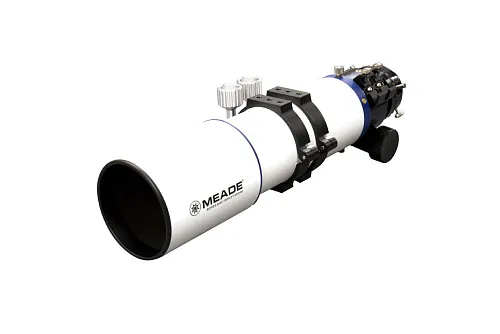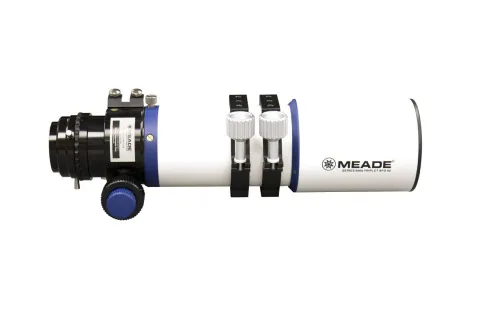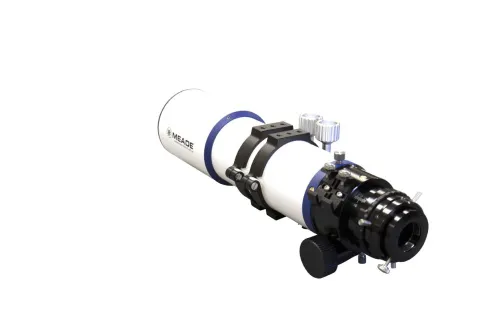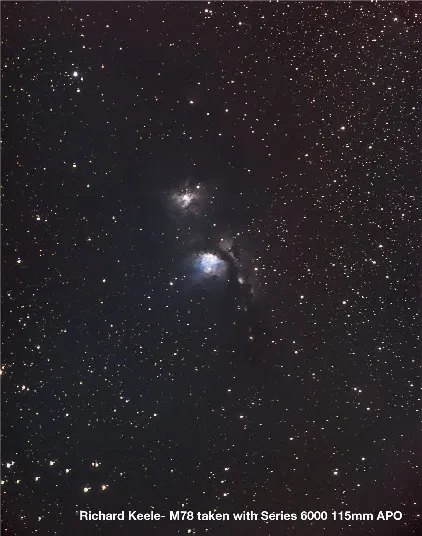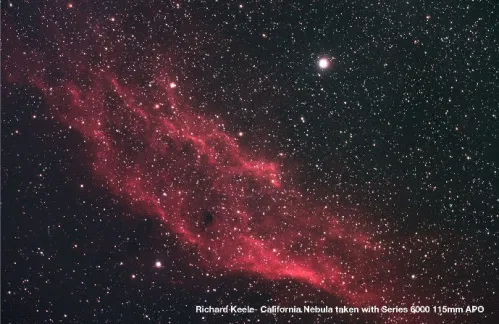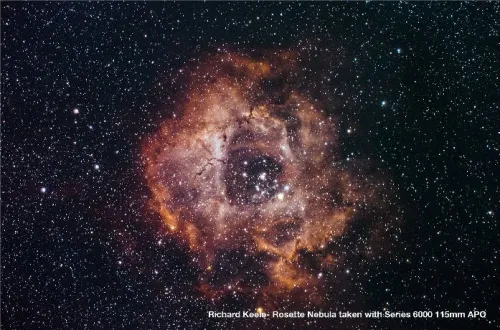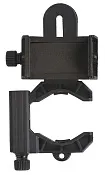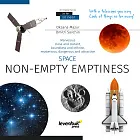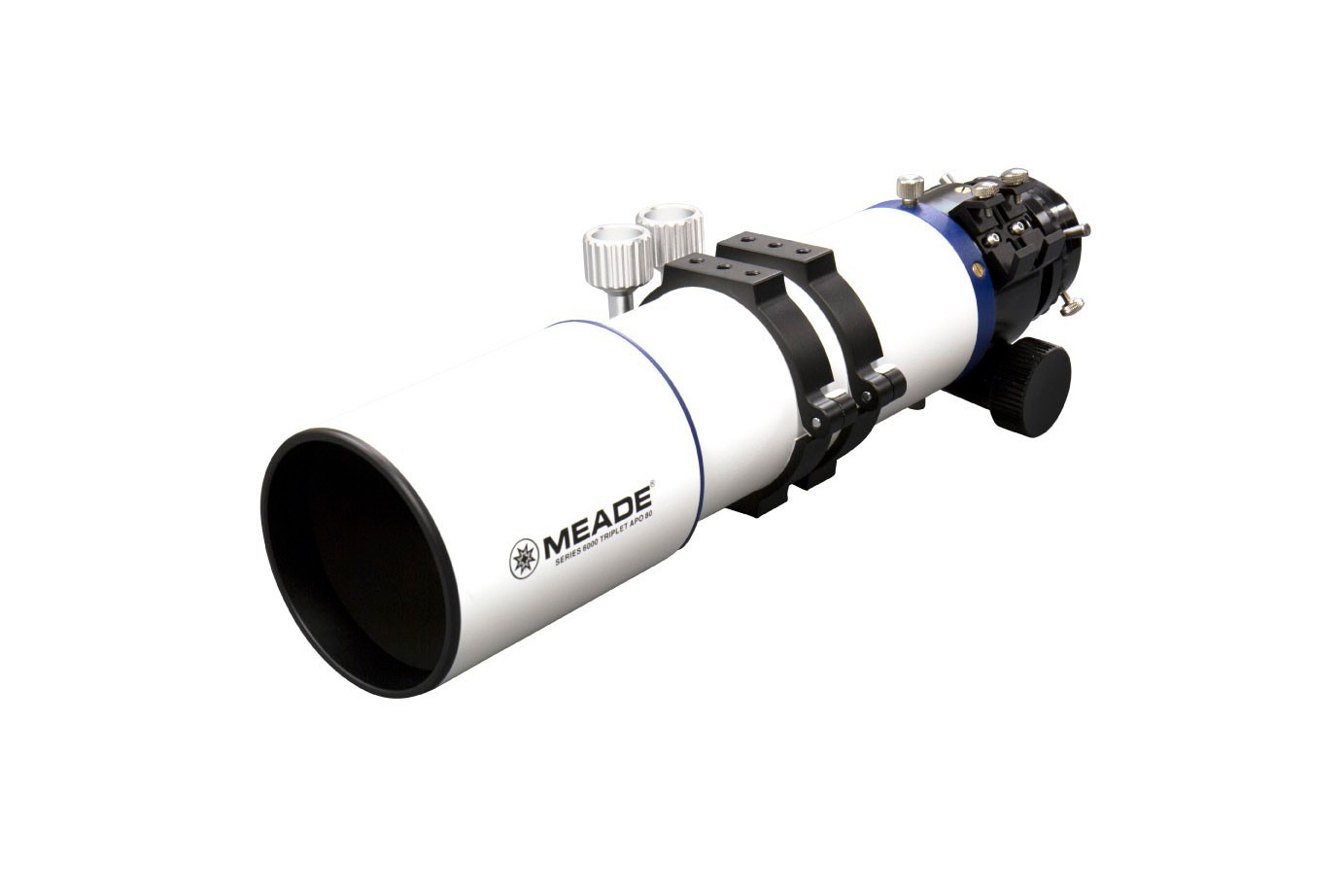Meade Series 6000 80mm ED Triplet APO Refractor OTA
Apochromatic refractor (triplet). Objective lens diameter: 80mm. Focal length: 480mm
| Product ID | 71697 |
| Brand | Meade Instruments Corp. |
| Warranty | 2 years |
| EAN | 0643824209022 |
| Package size (LxWxH) | 55x43x25 cm |
| Shipping Weight | 3.2 kg |
The Series 6000 Apochromatic Refractors are some of the best crafted refractors on the market. Each refractor is individually constructed and tested to ensure that they meet our highest standards, both optically and mechanically.
These telescopes were built with the observer and imager in mind. With the three element optical design using the highest grade extra-low dispersion optical glass, false color is virtually eliminated, yielding astonishing color correction, contrast, and sharpness.
New to the Series 6000 Triplets APOs is the proprietary 2.5" dual-speed rack-and-pinion focuser. The focuser comes with a 10:1 fine focus knob for precise focusing. It includes millimeter markings on the drawtube to assist with focusing accuracy and is also rotatable which allows for easy framing of the photographed object. New for this focuser is the 2" self-center locking ring that allows diagonals or cameras to be well centered to the optical train every time the locking ring is engaged.
Standard equipment also includes a fully extendable dew shield, mounting rings, a Vixen-style dovetail, and an aluminum hard carry case to protect your investment when not in use.
In addition to the deluxe focuser the Series 6000 Apochromatic Refracting Telescopes now have an optional 0.8x Focal Reducer/Field Flattener for photographic purposes. For wide field images the 2" focal reducer/flattener will reduce the 80mm refractor from f/6 to an f/4.8 and the 3" model will reduce the f/7 115mm and 130mm refractors to f5.5. The new reducer will optically flatten the images yielding pin-point stars to the edge of your photographic frame.
The Series 6000 Apochromatic Refractors will fill the need of the most discerning astronomer. For crisp wide-field observing and imaging, nothing can beat a true three-element Apochromatic Refractor (APO). Meade Series 6000 ED APO Triplets are among the finest available optically at any price.
Optical tube measures approximately 15.5" x 4.5" x 6" and weighs 3.1kg.
Features:
- Series 6000 80mm Triplet APO
- Fully multi-coated optics
- Vixen-style dovetail
- D=80mm. F=480mm. f/6 apochromatic refracting telescope
- Aluminum hard carry case included
| Product ID | 71697 |
| Brand | Meade Instruments Corp. |
| Warranty | 2 years |
| EAN | 0643824209022 |
| Package size (LxWxH) | 55x43x25 cm |
| Shipping Weight | 3.2 kg |
| Optical design | refractor |
| Optical scheme | 3-element apochromat |
| Optics material | FK53 ultra-low dispersion glass |
| Optics coating | multi-coated |
| Objective lens diameter (aperture), mm | 80 |
| Focal length, mm | 480 |
| Highest practical power, x | 170 |
| Aperture ratio | f/6 |
| Resolution threshold, arcseconds | 1.45 |
| Limiting stellar magnitude | 11.3 |
| Focusing | by moving an eyepiece |
| Eyepiece barrel diameter, in | 1.25, 2 |
| Focuser | 2.5", 2-speed (1:10), backlash-free, rack, precision |
| Additional | 1/4" tripod socket |
| Optical tube mounting mode | dovetail plate (Vixen standard) |
| Dovetail mount | ✓ |
| User level | beginners, experienced users, professionals |
| Assembly and installation difficulty level | extremely simple |
| Observed object | planets of the Solar System |
| Pouch/case/bag in set | case |
and downloads
Convenient diagrams that describe how to install additional accessories on refractors and catadioptric telescopes
Find out how to assemble a telescope on an example of the Levenhuk Skyline 90x900 EQ telescope
This short guide will help you avoid typical mistakes and learn more about telescope and mounting types
The basics of astronomical observations for beginners
Find a video review on the Meade 6000 Apochromatic Refractors Series that will impress you with their three-element optical design as well as perfect color correction and sharpness. These telescopes also have an optional 0.8x Focal Reducer/Field Flattener for photographic purposes
In this article we have gathered answers to some of the most frequently asked questions about telescopes
How telescopes work?
You can actually perform observations from your balcony!
All about telescope sizes, types, magnification, and mounts
Learn how to set up and use the telescope properly
Astronomy in light-polluted skies. Find out what you can observe in the city
Read an interesting comprehensive article on telescopes for little astronomers
Celestial objects you can observe with telescopes of different apertures
Colored and vivid images of galaxies, planets and star clusters entrance everyone who is fascinated by boundless space
Find an interesting review on the history of the changes to a refracting telescope
To make the process of choosing a telescope easier, we will tell you about the characteristics of the most popular types of telescopes today
Learn everything you need to know about refractor telescopes to make the right choice

